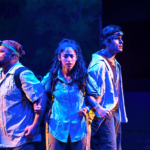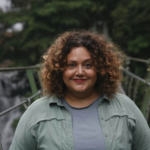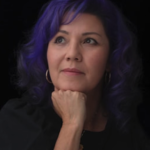By Robert St. Martin
Los Angeles, CA (The Hollywood Times) 10/25/24 – Currently on stage in Los Angeles is an interesting new play Luzmi – at the Intercity Arts Center in downtown Los Angeles in the Rosenthal Theatre. Luzmi is part of a larger theatre project “Nuestro Planeta” by the HERO Theatre directed by Elisa Bocanegra. The play opened on October 3, and I was fortunate to be there on October 13 to see the play. It runs through October 27. The play grew out of the research by theatre director Elisa Bocanegra in the Amazon region of Colombia near Mocagua, where she traveled on a Fulbright Fellowship exploring the impact the environmental impact of global warming and human exploitation of the Amazon rain forest. She brought along a Colombian-based playwright Diana Burbano who was commissioned to write a play about the situations they experienced in this remote corner of Colombia that touches the river near the border with Peru and Brazil.
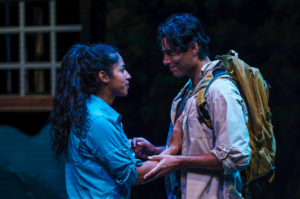
In an interview with Elisa Bocanegra, I was able to glean more information about the genesis of the play and its focus on environmental concerns in that part of the Colombian Amazon. Leticia, the capital of the department of the Amazonas District of Colombia as Colombia’s gateway into the Amazon rainforest. The city has a population of 33,000 and borders the Brazilian town of Tabatinga and Peru’s Santa Rosa, which lies across the water. Records suggest that Leticia was the name given to the settlement by an engineer named Manuel Charón back in 1867 when the area was part of Peru. Charón succumbed to the elixirs of love of Leticia Smith, a beautiful lady from Iquitos, and to perpetuate her memory, he named the small Amazon jungle port. A swathe of land north of the Putomayo River and the town of Leticia were claimed by Peru in 1932 and after a short-lived conflict the League of Nations awarded Colombia the disputed land in 1933. Leticia is known as one of the safest places to visit in the country due to a large military base in the border town. There is also a branch of the University of Colombia there.
This remote area of Colombia can only be reached by air or water – as there are no roads through the rain forest to get there. The destination for Elisa and playwright Diana was Puerto Nariño, a small port town on the Amazon across the river from Peru lands. The regions has farmland tended by Colombians who have moved here in hopes of an easier life than the cities of the interior of the country. It is also the homeland of the indigenous Ticuna people. North of the few river towns is the large Amacauacy Natural National Park, which has incredible biodiversity and the home of many species of birds. The area has become popular with eco-tourists who come to the area to visit the Amazon rain forest for birdwatching and other activities. Although the area is supposed protected as a natural national river, there is a big problem with illegal logging. Eco-tourism has its drawbacks because it brings many tourists to the area – and has a negative impact on the fragile economy of the river towns.
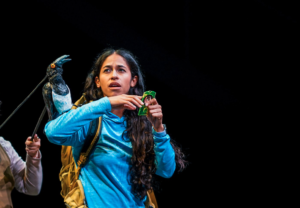
While staying in Puerto Nariño, Elisa Bocanegra and playwright Diana Burbano interviewed the local people about their lives and struggles. They gathered information about the threats to the Amazon rainforest and the situation on the river itself which has recently dropped considerably due to drought – related to climate change. They also were also to talk with biologists who specialize in the eco-diversity of the Amazon region as well as a professor from the local ethnographic museum who is an expert on the Ticuna people and other Amazon tribes who live along the river. All this research proved to be food for a larger project launched by Elisa Bocanegra and the play that Diana Burbano was to write.
All Diana needed was a central character modeled a bit on an environmentally-sensitive character who was created as Luzmi – a young professor at a university in New York City who has decided to go to Colombia for a sabbatical of sorts. Why Colombia? At the start of the play, we learn that her mother recently died and Luzmi (played by Stephanie Hoston) wants to reconnect with her place of origin in the Amazon of Colombia – a place about which she knows little because her mother never told her much. She was raised to believe that her father died long ago, and her mother left Colombia for the United States where she raised Luzmi as a single mother.
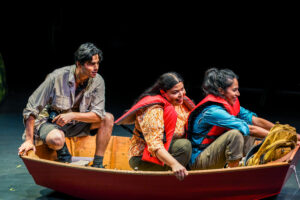
In the play’s first act, we encounter Luzmi packing for her trip to Colombia and explaining to some of her students the purpose for her trip. Once Luzmi arrives in Porto Nariño in the Amazon, she goes to stay with her aunt Alma (Bibiana Nieves) who she has never before met. Her aunt has a small but not very productive farm and occasionally puts up eco-tourists who come to the region. Apparently, there are issue with property deeds where Colombians have squatted on lands that the federal government considered to part of the Amacauacy Natural National Park. The federal government is increasingly diligent in reclaiming former rain forest and pushing squatter farmers off their land. Aunt Alma is a happy, resilient woman who refuses to worry about the future possibility of the government kicking her off the land.
Her household includes Verso (Julian Juaquin) who helps out and occasional visits from a local biologist Carlos (Peter Mendoza) who offers eco-tourists walks through the nearby rainforest for find rare species of birds.
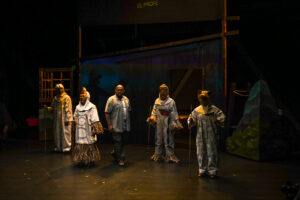
Upon her arrival in the Amazon, Luzmi is amazed by everything she sees and encounters. She marvels at the colorful birds, which we encounter moving on stage with the help of puppeteers (Adrian Quinonez and other cast members. She encounters some typically gringo “ugly” eco-tourists who pay to spot birds and take photos. After getting lost in the rain forest, she is helped back by the biologist Carlos who seems to take a shine to her from the start. The first act of the play provides us with realistic tension between difference viewpoints of the locals. Aunt Alma hopes to keep her farm despite pressures from the federal authorities. We meet another local woman named Claudia (Helena Betancourt) who is more concerned about the general economic plight of the local Colombians and wants to sell off lands to loggers and set up more eco-tourism to draw in money. Claudia hates being poor and imagines many ways to improve her situation – but at the price of destroying the rain forest. Act 1 ends abruptly as the federales show up to put Alma off her farmland and arrest members of her household.
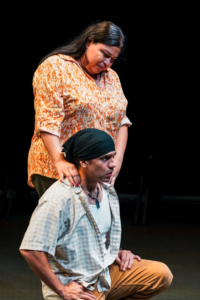
The play takes on a more romantic aspect in Act 2, as Luzmi, suffering from some mysterious ailments, falls ill and several people attempt to help her. But it is the growing fondness of Carlos the biologist for her that emerges as the focus of the play at this point. Simmering in her head the whole time is Luzmi’s awareness that one of the reasons for coming to Colombia was to throw the ashes of her deceased mother into the place whence Luzmi was born – near the Amazon. Her Aunt Alma reveals that Luzmi indeed had a father who lived in the region. Luzmi had assumed that he was dead, but we gradually learn that he is still alive and lives with the local indigenous people as an expert on local medicines.
Act 2 provides us with several story strands: Carlos needs to get Luzmi and Claudia out the Puerto Nariño and go upriver to avoid the federal authorities. Luzmi will be encouraged to go visit an old man (Emanuel Loarca) who lives in the rain forest who is a shaman and may very well be her long-lost father. Carlos begins to show that his protective concern for Luzmi is real love, and he is convinced that he wants to be with her. These threads weave together in the play and culminate in Luzmi realizing that she does like Carlos more than she first realized. The meeting with the forest shaman is transformative for her as Luzmi encounters a set of local indigenous tribal people with animal masks and body paint dancing in a ceremony. This part of the play embraces a kind of magical realism that is staged to pull the audience inside the depth of the mysterious draw of the Amazon which Luzmi comes to realize is part of herself.
The play Luzmi covers a lot of thematic territory in the course of its exposition and that is why Act 1 seems a bit slower than Act 2, where the various plot threads come together. The final scenes with Luzmi in the tribal village are magical and we encounter none other than the voice of the Moon itself (Carla Valentine) telling Luzmi that she is finally home in her place of origin. This is a fascinating play and may take some viewers a bit of effort to fathom its depth but certainly worth the effort it. So much is at stake right now in this part of the Amazon rain forest and I believe that the play captures it well.



